|
|
|
Sort Order |
|
|
|
Items / Page
|
|
|
|
|
|
|
| Srl | Item |
| 1 |
ID:
178170
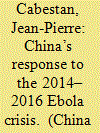

|
|
|
|
|
| Summary/Abstract |
The 2014–16 Ebola crisis in West Africa was China’s very first opportunity to demonstrate its willingness and ability to play a meaningful role in addressing public health emergencies of international concern. China’s decision to participate in the international response to the outbreak was part of an ambition to enhance its contribution to Africa’s security in general and health security in particular and to exert more influence on global norms. The specific role played by the People’s Liberation Army (PLA), especially its Academy of Military Medical Sciences, in Sierra Leone and Liberia is part of an ongoing effort to increase China’s involvement in international humanitarian assistance and disaster relief operations. It was the first time that it sent medical military teams to set up and operate infectious disease hospitals overseas. This participation also underscores the PLA’s crucial role in fighting epidemics overseas as well as at home, as the current COVID-19 pandemic illustrates. The Ebola crisis enables us to explore aspects of the PLA’s overseas missions, some of which are humanitarian and others which generally enhance China’s influence as a great power in Africa and in the world in the context of a growing Sino-US strategic competition.
|
|
|
|
|
|
|
|
|
|
|
|
|
|
|
|
| 2 |
ID:
178174
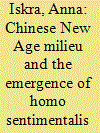

|
|
|
|
|
| Summary/Abstract |
The accelerating speed of economic, social, and cultural reforms in the past three decades in mainland China has created an atmosphere of moral uncertainty that encouraged many people to search for happiness by turning inwards. Shen xin ling (身心灵, translated as Body-Heart-Soul) fever refers to the growing interest among Chinese urbanites in various seminars that creatively transform the guiding principles of the Euro-American New Age movement, incorporating China into transnational networks of alternative spiritualities. This anthropological investigation into the shen xin ling milieu locates its genealogy in the progression of several post-Maoist self-cultivation fevers, most notably the recent ‘psycho-boom’. It focuses on Chinese New Agers’ practices of emotional release, conceptualizing them as ‘psy-venting’ spaces where the emotions that could result in resentment at those who perpetuate structural inequalities are released, dispersed, and channelled back to the individual. In so doing, these affective flows become carriers for Chinese state discourses related to therapeutic governing. This process is characterized by tensions as shen xin ling practitioners find themselves positioned at the intersections of state-endorsed discourses on consumerism, entrepreneurialism, the re-traditionalization of gender roles, and anxieties over multilevel marketing schemes and accusations of ‘evil cult’.
|
|
|
|
|
|
|
|
|
|
|
|
|
|
|
|
| 3 |
ID:
178172
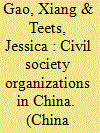

|
|
|
|
|
| Summary/Abstract |
This article examines how civil society organizations navigate local government to secure more inclusive environmental governance. Based on an in-depth case study of water governance in Zhejiang Province between 2012 and 2018, we find that Green Zhejiang, a civil society organization, exercised informal power to hold the local government accountable based on two strategies: mobilizing citizens to collect information on water pollution and strategically leveraging the authority of provincial government to find citizen-focused solutions. Most existing studies foreground one stage of the policy process – advocacy in the agenda-setting phase, policy entrepreneurship during the design phase, or monitoring during the implementation phase; however, we examine strategies of civil society organizations throughout this policy lifecycle. With this approach, we are able to analyse the strategic interactions between different levels of the government and civil society organizations and locate the positive outcomes and limits under the current governance system. Despite policy successes, Green Zhejiang still acts informally, which limits long-term effectiveness. However, incorporating citizens into public administration in a meaningful way requires sharing policymaking power formally, and thus far, local governments are only willing to share power in an ad hoc and informal way. More institutionalized citizen participation is necessary to develop innovative solutions to the severe environmental degradation in China.
|
|
|
|
|
|
|
|
|
|
|
|
|
|
|
|
| 4 |
ID:
178171
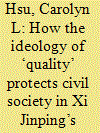

|
|
|
|
|
| Summary/Abstract |
Under Xi Jinping, the Chinese state has asserted authoritarian control over many aspects of civil society. Yet there is evidence that Chinese citizens are continuing to mobilize and organize with relative levels of success. This article examines one mechanism that prevents the Chinese state from eliminating civil society: the political ideology of suzhi (素质), translated as ‘quality’ in English. In the post-Mao era, the Chinese Communist Party (CCP) has increasingly invested its political legitimacy in its ability to deliver a rising quality of life to its citizens. This dynamic means that it is possible for Chinese citizens to mobilize and organize to achieve their goals. Suzhi ideology gives citizens one set of means to effectively limit undesirable behaviour by the state. It also provides citizens with leverage to make the state respond robustly to their needs and desires. It opens up possibilities for citizens to solve social problems on their own, without recourse to state actors. This article will examine four arenas of Chinese civil society which suzhi ideology protects under the Xi regime: media-inspired public outrage; public protests and demonstrations; NGOs as state consultants; and the increased accessibility of litigation.
|
|
|
|
|
|
|
|
|
|
|
|
|
|
|
|
| 5 |
ID:
178173
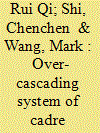

|
|
|
|
|
| Summary/Abstract |
China’s cadre evaluation system – the personnel management system used to assess the performance of government officials in the party-state – is considered an important tool for upper-level governments to supervise and regulate lower-level agents. This system is one of the key factors contributing to the Chinese Communist Party’s (CCP) authoritarian resilience. Deficiencies of this system are exemplified by the ‘blind pursuit of GDP’, selective implementation, gaming, collusion, and data fabrication. The CCP has been reforming this system to strengthen its monitoring and political control over local government cadres, especially at the county level, and it is a crucial component in the step-by-step hierarchical power structure. While current literature focuses largely on the assessment content of such reform, this article pays specific attention to the changes in the cascading evaluation structure of province to prefecture to county. The article identifies a new dynamic of ‘over-cascading’ whereby provincial governments bypass prefectural governments and directly evaluate county officials, resulting in the co-existence of prefecture-county and province-county evaluations. This article also explores the functioning mechanism of this dual structure and argues that this structural change in the cadre evaluation system is breaking the traditional hierarchical governance structure and enhancing authoritarian resilience of the CCP because it provides a new route for over-cascading governance between provincial and county governments. This research contributes to the conceptualization of the over-cascading governing structure of the CCP and fills gaps in the literature on structural changes in China’s cadre evaluation system.
|
|
|
|
|
|
|
|
|
|
|
|
|
|
|
|
|
|
|
|
|